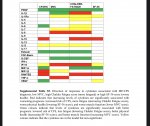Martin aka paused||M.E.
Senior Member
- Messages
- 2,291
Dear community,
I ask for your help. I'm not so sure, from all I've heard, whether ME / CFS is really the only disease with PEM.
Briefly about my course: Onset 2013 (no infection remembered), very mild course form (could work, study, do sports etc.). The only thing that was present was the constant feeling of flu, which got worse with intense overexertion (drinking nights) and sometimes tied me to bed for an hour.
In 2015, mild psoriasis broke out after a streptococcal infection. The feeling of flu disappeared
At the end of 2015, the psoriasis disappeared.
Because of a chlamydial infection, I was given ciprofloxacin in January 2016 and got floxed. Symptoms are similar to ME, except that you don't have PEM. They disappeared again by the summer of 2016. Then some of them came back in July (especially muscle pain and tingling in arms and legs).
In August 2017, after a week in Croatia, I suddenly became moderate. I had diarrhea on the day of my departure and that lasted for a week. At the airport for the return flight I had to lie down because I could no longer stand. From then on I had severe PEM.
In February 2018, I overdid so heavily that I've been bedridden ever since.
My symptoms are: PEM, tinnitus, sensitivity to sensory stimuli, sometimes breathing problems, sometimes blurred vision, extreme weakness, POTS, high heart rate even when lying down, IBS, sleep disturbances, sometimes (only when I crash) sore throat... everything gets worse when I crash. I don’t have pain.
Infections: Coxsackie B4 and weak HHV6B (400 copies), contradictory results of Lyme (Antibiotics didn't help).
It all sounds a lot like ME / CFS. However, I deviate from the research situation.
This study investigates cytokines and chemokines in ME/CFS
https://www.medrxiv.org/content/10.1101/2020.08.17.20164715v1.full.pdf
(screenshot attached)
The only accordance is that I have elevated IL-1b and IL-8 and MCP-1. The rest is low.
I did a metabolon test in 2019 and it shows a highly disturbed metabolism.
I also have oxidative stress.
No leaky gut.
Normal intrcellular ATP
My NK cells are also low as shown in some studies.
TGFbeta normal, TNFa normal…
Almost no B-cells, mild relative T-lymphocytosis, Thymus activity low...
Abilify and benzos help a lot!!!
But regarding cytokines and chemokines I question myself: Do I have something different, that also had PEM? Because here are many stories of people who lived for year's with the diagnosis ME/CFS and then finally found out they have something completely different.
What do you think? Any input is very much welcomed!
Martin
I ask for your help. I'm not so sure, from all I've heard, whether ME / CFS is really the only disease with PEM.
Briefly about my course: Onset 2013 (no infection remembered), very mild course form (could work, study, do sports etc.). The only thing that was present was the constant feeling of flu, which got worse with intense overexertion (drinking nights) and sometimes tied me to bed for an hour.
In 2015, mild psoriasis broke out after a streptococcal infection. The feeling of flu disappeared
At the end of 2015, the psoriasis disappeared.
Because of a chlamydial infection, I was given ciprofloxacin in January 2016 and got floxed. Symptoms are similar to ME, except that you don't have PEM. They disappeared again by the summer of 2016. Then some of them came back in July (especially muscle pain and tingling in arms and legs).
In August 2017, after a week in Croatia, I suddenly became moderate. I had diarrhea on the day of my departure and that lasted for a week. At the airport for the return flight I had to lie down because I could no longer stand. From then on I had severe PEM.
In February 2018, I overdid so heavily that I've been bedridden ever since.
My symptoms are: PEM, tinnitus, sensitivity to sensory stimuli, sometimes breathing problems, sometimes blurred vision, extreme weakness, POTS, high heart rate even when lying down, IBS, sleep disturbances, sometimes (only when I crash) sore throat... everything gets worse when I crash. I don’t have pain.
Infections: Coxsackie B4 and weak HHV6B (400 copies), contradictory results of Lyme (Antibiotics didn't help).
It all sounds a lot like ME / CFS. However, I deviate from the research situation.
This study investigates cytokines and chemokines in ME/CFS
https://www.medrxiv.org/content/10.1101/2020.08.17.20164715v1.full.pdf
(screenshot attached)
The only accordance is that I have elevated IL-1b and IL-8 and MCP-1. The rest is low.
I did a metabolon test in 2019 and it shows a highly disturbed metabolism.
I also have oxidative stress.
No leaky gut.
Normal intrcellular ATP
My NK cells are also low as shown in some studies.
TGFbeta normal, TNFa normal…
Almost no B-cells, mild relative T-lymphocytosis, Thymus activity low...
Abilify and benzos help a lot!!!
But regarding cytokines and chemokines I question myself: Do I have something different, that also had PEM? Because here are many stories of people who lived for year's with the diagnosis ME/CFS and then finally found out they have something completely different.
What do you think? Any input is very much welcomed!
Martin
Attachments
Last edited:

